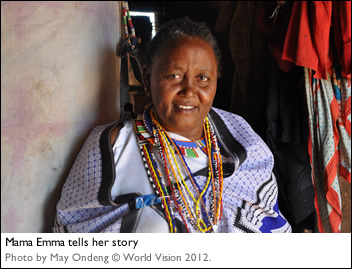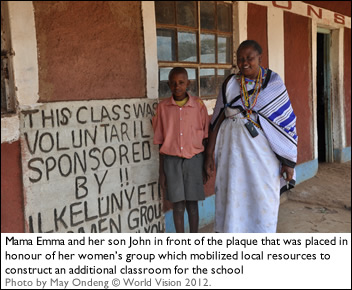Uneducated woman fights for girls' education in Kenya
By May Odeng
 Topoti Emmaculate Musheini missed her chance at education.
Topoti Emmaculate Musheini missed her chance at education.
“My father refused to let me go to school and sent my older brother to school instead of me,” she says, remembering her childhood in rural Kenya.
Now a woman, Mama Emma, as she is known in her community, says her father’s decision limited her choices for the future.
“I can’t read and write. I have enrolled in adult education classes but it’s not easy,” Mama Emma says, now 52 years old.
Fighting for girls’ education
Determined that other girls would not suffer the same fate as she, Mama Emma joined forces with other mothers in her community. Together, they became well-known advocates for girls’ education.
The women’s group has helped get more girls into school in their community, paying school fees and mobilizing their community to build better classrooms to ensure students, particularly girls, can learn better.
Mama Emma, who is the mother of five children, says World Vision has been an integral partner in helping to transform her community.
Working throughout the region, World Vision built 37 classrooms in schools in Mashuru.
 In some of the schools, dormitories and administration blocks have also been built. Schools have been provided desks and many children have been supported with school fees in both formal and vocational training.
In some of the schools, dormitories and administration blocks have also been built. Schools have been provided desks and many children have been supported with school fees in both formal and vocational training.
What’s more, World Vision has helped establish a school feeding programme that provides one meal a day to school-going children in select schools. Enrolment has improved 17% in the participating schools because of the feeding programme.
World Vision has given us knowledge
“It is not a cow or wealth that educates someone. It is knowledge and that is what World Vision has given us. World Vision has taught us. It is up to someone to apply what they have learned,” Mama Emma says.
When World Vision began its work in Mama Emma’s community in October 2000, some of the existing problems identified in the community included lack of access to safe water, high incidence of preventable diseases among children, low school enrolment and general food insecurity due to lack of adequate rainfall.
One by one, World Vision has worked with the community to tackle the challenges.
Access to safe water has improved after water pipelines and tanks were set up. More than 100 households have benefited from the various water projects.
The high incidence of preventable diseases among children and mothers has been tackled. Immunisation campaigns, breastfeeding awareness education and prenatal and antenatal clinics have been set up. Education about personal hygiene has been provided and latrines were constructed to prevent diseases. As well, education about HIV and AIDS has been provided.
“World Vision has taught me a lot,” says Mama Emma. “Through our women’s group we have been able to support each other as well as do so much together for our community. World Vision opened my eyes to greater opportunities around me.”